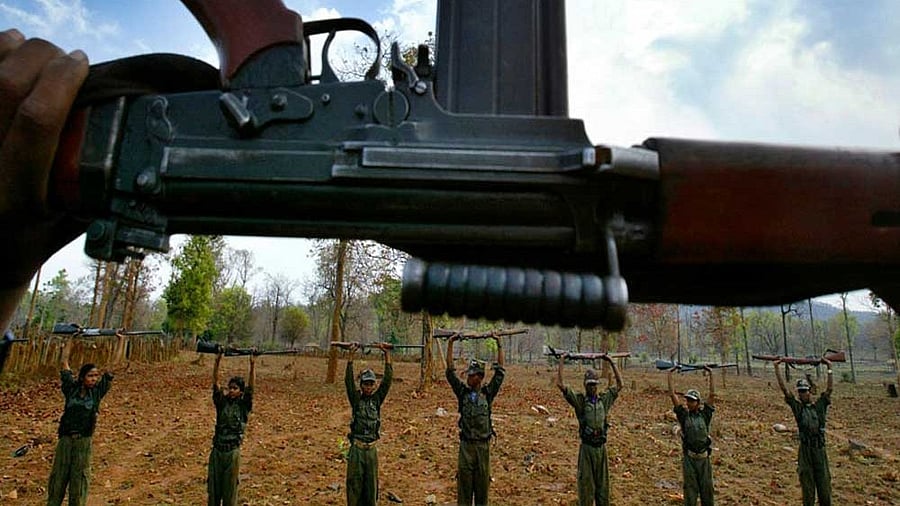
A representative photo.
Credit: PTI File Photo
Hyderabad: The outlawed CPI (Maoist) organisation, facing heavy reverses under sustained security operations, appears to be undergoing one of its deepest leadership crises in decades, with senior leaders openly divided on the question of renouncing the armed struggle.
The debate began after politburo member Mallojula Venugopal Rao, alias Abhay, released a statement saying it was time for the party to consider giving up weapons temporarily and opening the door for peace talks with the government. Abhay, a top strategist in the Maoist organisation for over four decades, said there was a growing opinion within the ranks in favour of ending the insurgency but stressed the need for a broader consensus.
His letter was met with an immediate rebuttal from Telangana committee spokesperson Jagan and senior central committee members Kadari Satyanarayana alias Kosa and Katta Ramachandra Reddy alias Vikalp. They dismissed his view as “personal opinion” and warned that if Abhay did not surrender his weapons voluntarily, the People’s Guerrilla Army would “seize” them. The unusually sharp language against a senior figure pointed to the growing rift within the leadership.
Abhay, believed to be 69 and underground since the 1970s, hails from Peddapalli in Telangana. Long referred to by the aliases Abhay, Sonu, and Bhupati, he has been associated with organisational strategy and propaganda. His elder brother, Mallojula Koteshwar Rao alias Kishenji, was a member of the central committee and politburo until he was killed in an encounter in West Bengal in 2011.
Abhay emerged as one of the most visible figures of the Maoist leadership after the death of spokesperson Cherukuri Rajkumar alias Azad in 2010. Since then, he has issued press statements under the name Abhay. His prominence increased further after the death of general secretary Basavaraj, when his name was considered for the top post.
Statement with photo
The latest statement shocked observers for its unprecedented form and content. Apart from openly announcing a “temporary renunciation of armed struggle” and “decision to give up arms”, it was accompanied by Abhay’s photograph, along with an email address and Facebook ID. This is the first time an underground Maoist leader has publicly released his image. Skepticism over its authenticity ended when an audio clip appeared confirming the statement in Abhay’s voice.
Notably, the language used in the release was softer than usual about political leaders, even referring to the Prime Minister and the Home Minister with respect, an unusual departure from the group’s routine rhetoric.
The statement comes at a time when insurgency is under severe pressure from Operation Kagar, which has seen dozens of cadres eliminated in successive security operations across multiple States in recent months.
What has added to speculation about an ideological shift is that several members of Abhay’s family, themselves part of the leadership, have recently surrendered. In December 2024, his wife, central committee member Vimala Sidam alias Tarakka, quit, citing health problems and the pressure of security crackdowns. Earlier this month, his sister-in-law and fellow central committee member Potula Padmavati alias Sujatha surrendered in Hyderabad.
According to former leaders, the organisational structure today is too weak to build consensus. “The last proper central committee meeting was in 2012, followed by one in 2016. Since then, as far as my understanding goes, they have been unable to gather due to constant operations and logistics. Without meetings, consensus is impossible,” G Narasimha Reddy alias Jampanna, who spent 35 years underground and served as a central committee member for 17 years, told DH.
The central committee and politburo together serve as the highest decision-making body of the CPI (Maoist).
He added that ideological splits are not new to the CPI (Maoist). “There were divisions after 1977, yet the movement gained strength later. But this situation is different because the leadership itself is crippled by sustained security actions and surrenders,” he said.
Another surrendered leader, while cautioning against overestimating the split, said Abhay’s views should not be seen as isolated. “Even his critics referred to him as a politburo member. That shows he still enjoys stature. Some State and central committee leaders must be supporting him,” he told DH.
With police and intelligence agencies closely monitoring these developments, security officials say the coming weeks will be crucial.